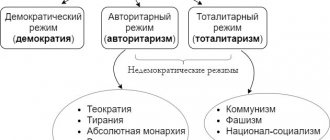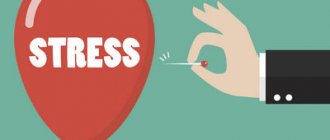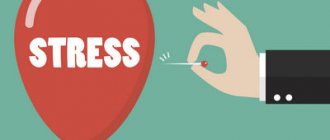.
Modern man spends most of his time at work. Some people can't forget about work even when they're at home. People are often tense and experience professional stress because of work. The reasons for the development of nervous tension are different for workers in different fields of activity, but the signs and consequences are the same for everyone. Stress at work and at home reduces a person's interest in life and depletes his creative and intellectual abilities. Psychological stress leads to many diseases. Special exercises, training, and stress relief methods will help you avoid this.
Professional stress accompanies representatives of different professions
Types of work stress
In the process of work, there are irritating factors. They can cause short-term nervous stress. If their negative impact is prolonged, occupational stress becomes chronic. There are the following types of professional stress:
- Physical. The reasons for its occurrence are uncomfortable working conditions, cold, heat, and increased noise levels.
- Informational. Occurs due to mental overload and increased demands. Very often it affects people who combine two positions or rapidly climb the career ladder.
- Emotional. Associated with a person’s inability to adapt to the proposed conditions, set priorities, and complete assigned tasks. A monotonous work schedule or sudden changes in activity are causes of emotional stress.
- Communicative. Professional stress is caused by an employee’s inability to communicate with colleagues, superiors, defend their interests (or, conversely, remain silent), and make useful work acquaintances.
The causes of stress at work can be different, so the division into specific types of work stress is arbitrary. People with low self-esteem and increased anxiety are most susceptible to work stress. Lack of motivation and clearly defined goals also reduces stress resistance.
Types of professional stress
Signs of stress at work
Chronic stress at work can manifest itself in different ways. Signs of stress at work are individual for each person and depend on the characteristics of the body and the type of nervous system. The main features can be identified:
- forgetfulness;
- inattention at work;
- increased fatigue;
- irritability;
- causeless melancholy;
- loss of sense of humor;
- lack of joy from the results of work, praise, etc.;
- headache;
- pain in the back, stomach;
- loss of appetite.
Very often, against the background of psychological stress, a feeling of anxiety and helplessness arises.
You can get rid of unpleasant symptoms if you completely cope with stress at work.
You can calm down in a stressful situation without pills and alcohol. These methods are short-term and addictive
The need to change jobs
If work has ceased to bring pleasure, it can be called a routine, you should think about quitting. Perhaps this attitude is the result of accumulated fatigue. Therefore, first you need to take care of proper rest and proper nutrition. Healthy sleep, more than 8 hours per day, is the basis of good health. If, after regaining strength, the attitude does not change, we can conclude that the problem is in work.
Pregnancy aggravates nervous tension, which leads to increased anxiety. In such a situation, you need to clearly define your capabilities and, if your health is at risk, refuse difficult work.
Note! Women expecting a child can count on favorable working conditions before going on maternity leave. The legislation provides for a reduction in working hours and a reduction in workload. You need to remember this and, if necessary, contact management with a similar request.
In the absence of career growth and salary, work turns into monotonous fulfillment of duties. A continuous routine has a negative effect on the nervous system and leads to the development of somatic diseases. You can offer management options for developing the company and show independence. If enthusiasm is eradicated, a person will not receive moral satisfaction. Working without desire will eventually turn into a hateful pastime, leading to irritability, fatigue and sleep disturbances.
If the duties are difficult to perform, take a lot of energy, and the reward does not correspond to the losses incurred, it may be worth refusing such work. Ultimately, the incentive to complete tasks will disappear, which will lead to experiences that, in a cumulative effect, will provoke stress.
Excessive workload
If the performance of certain duties contradicts moral principles, when when performing them you need to step over established beliefs, you need to quit without hesitation. Work should not destroy a person. There is no need to agree to a dubious event, even if you pay extra for it. Doing something that does not correspond to life values will lead to internal struggle. A person will reproach himself, blame himself for what he has done, which will lead to worries and emotional disorders, which will not be easy to overcome.
Stages of development of professional stress
Stress is a normal adaptive reaction of the body, which is regulated by the nervous and endocrine systems. Depending on the duration of the irritating factor, the following phases of development of professional stress are distinguished:
- Anxiety. The first reaction to a stimulus, the level of adrenaline in the blood rises, the body mobilizes strength to fight or save.
- Resistance. Occurs when the stressor is very strong and its effect is prolonged. The result of the body's adaptation to new circumstances is a decrease in the activity of physiological processes. All changes occurring at this stage are reversible.
- Exhaustion. The continuous action of a stress factor leads to the fact that the body has no strength left to fight, and its defense mechanisms are broken.
In the first two stages, stress can be overcome on your own. At the stage of exhaustion, it is already very difficult to overcome stress without outside help. It is imperative to eliminate the effect of the irritating factor or change your attitude towards it.
Dynamics of development and consequences of professional stress
What is stress?
Stress is an emotionally tense state of a person that arises as a response of the body to excessive stress, pressure, and overwork. Stress is not the cause of painful tension, it is itself a disease.
There is positive stress - eustress, when a slight shock due to negative factors affects the body positively. At the same time, adrenaline is produced, attention, concentration and intelligence increase. Under positive stress, a person makes decisions correctly and quickly; he seems to be charged with strength and energy.
Distress has a negative impact: it destroys the human body, causes strong emotional stress, affects the nervous system, weakens the immune system, as a result of which colds and other diseases progress.
The causes of stress can be both negative influences - ruin, divorce, severe physical injury or a sharp deterioration in health, and positive ones - unexpected luck in the lottery, sudden happiness or an unexpected inheritance.
When under stress, a person goes through three stages:
- Anxiety. This is a normal mental reaction, warning of possible danger to a person. It mobilizes all the protective functions of the body. Signs include increased blood pressure, rapid heartbeat, and anxiety.
- Resistance. The body adapts to stress. With prolonged pressure or aggression, addiction occurs, which allows the body to become more resistant to stress. Physically manifests itself as fatigue, forgetfulness and anxiety.
- The third stage is exhaustion. When the body can no longer resist, and psychological and physical strength is running out, then this stage begins. At this stage, you can easily get serious illnesses.
Consequences of professional stress
The negative consequences of occupational stress are associated with persistently increased concentrations of glucocorticoids in the blood. They affect the cardiovascular, nervous, reproductive and immune systems of humans.
Consequences of prolonged work stress:
- Heart rhythm disturbances, increased blood pressure.
- Gastritis, peptic ulcer of the stomach and intestines.
- Kidney diseases.
- Dermatitis.
- Gaining body weight or its sharp decrease.
- Depression.
- Alcoholism.
- Frustration (stress and frustration have much in common. It is manifested by anxiety, despair, anger, aggression).
Stress and performance of a manager
Stress in a manager’s work occurs very often and is difficult to avoid. Young specialists who have just assumed a leadership position are especially affected. The following organizational stress factors can be identified:
- The need for constant monitoring of employee performance.
- Responsibility for the performance of all employees.
- Material liability.
- Low motivation of subordinates.
- Discrepancy between the effort expended and the result obtained.
- Excessive demands from top management.
- Lots of paperwork.
- Interpersonal conflicts with business partners and employees.
- Condemnation by subordinates of the work, actions, and personal qualities of the leader.
With constant nervous tension, the performance of a manager decreases. He cannot organize the work process normally and often lashes out at his subordinates. This worsens the overall atmosphere in the organization.
Managerial stress negatively affects the performance of the entire enterprise.
The impact of stress on staff performance
Stress and its impact on work efficiency are one of the important subjects of study in modern psychology. New approaches are being developed to solve the problem. Why does work stress occur among organizational staff:
- The employee’s lack of understanding of his place in the team and the purpose of his activity.
- Performing different duties by one employee.
- Reaching the peak of your career, no further prospects for growth.
- Long absence of vacation.
- Undervaluation of work by the manager.
The listed factors cause low motivation of employees, which, in turn, causes stress in the work of the manager. A vicious circle is formed - subordinates and bosses irritate each other. The faster a tense situation is resolved, the faster the company's performance will improve.
Major stressors
Many external factors can trigger the development of professional stress.
The most common:
- Communication. The sphere of interaction between people is characterized by the greatest concentration of stress. Special skills are required to interact with teams, partners and clients. Criticism and problems cause tension, leading to stress.
- Wrong priorities. Dissatisfaction with results due to abandonment of important tasks can cause tension.
- Time restrictions. When an employee is given very tight deadlines, he will have to forget about high-quality completion of the task. At the same time, the rush itself due to the fear of not being on time can cause stress.
- The requirements are too high. Excessive demands, complex tasks and many other difficulties not only complicate the performance of work, but also have a negative impact on work efficiency, causing stressful situations.
These are the main factors that can lead to the development of stress. This also includes monotony of work, too busy schedule, poor working conditions, and low income.
The mechanisms of accumulation of professional stress are as follows::
- single - leads to burnout, as it is constantly exposed without specific injury;
- traumatic - this includes all events that traumatize a person’s psyche, such as an emergency at work or other events that can make a strong impression.
Constant stress can lead to alcohol or drug addiction.
Stress Relief Techniques
How to overcome stress? It has already become a tradition in enterprises and offices to organize corporate parties. This is a great way to relax, get to know your colleagues better, and build relationships with them. However, holidays are rare, and during working hours, stress in the activities of the manager and ordinary employees occurs every day. Therefore, there are a number of methods that allow you to relieve stress on any working day:
- Before leaving home for work, you need to do several breathing exercises and drink herbal tea with mint, lemon balm or chamomile at breakfast.
- Breathing exercises help calm your nerves at work. As soon as psychological discomfort appears, you can do exercises with slower exhalation. To do this, you need to take a deep breath, count to yourself to two, then slowly exhale, counting to four. Once you get used to this exercise, you can count 3:6 or 4:8 while breathing. Exercise relaxes muscles and normalizes heart function.
- Changing activities relieves mental stress. You can find five minutes every two hours to distract yourself by drawing or listening to music. During your lunch break, it is better to leave the work area. Then stress will disappear and performance will increase.
- It is very important to maintain friendly relations with colleagues and communicate with them on topics remote from work. And it is better to minimize communication with people who cause hostility, trying to follow the rules of politeness.
- After work, you can relieve stress by walking in the park. You need to completely free your head from thoughts about work and problems, you can watch people, nature, birds, take photos. You can take a contrast shower at home.
A short break to music will relieve stress
Preventive measures
You can eliminate the consequences of work stress, or you can try to prevent its occurrence. To do this, remember the following tips:
- always look for something “to your liking”, and not just for the sake of money, if it does not evoke an internal response in you;
- Don’t make work the only meaning of your life, even if it’s your favorite one. In addition to this, let you have a favorite hobby, and don’t forget to devote time to your loved ones and friends;
- take care of yourself: take care of your physical and mental health;
- develop flexibility in communicating with colleagues and superiors, learn to reduce the degree of internal tension;
- increase your self-esteem, improve your professional abilities, grow as a specialist;
- do not try to find happiness or salvation in work - it is only part of a full life;
- Be open to the world, develop an optimistic mindset - and then you will most likely never know what burnout is at work!
Stress in certain professions
The most nervous and emotionally costly professions are those that involve working with people; they are associated with training, education, service, and leadership. Let's consider the tensions in some professions of this type.
Teacher and educator
Working with children is associated with daily nervous tension, which reduces the teacher’s ability to work.
The main stress factors in the work of a teacher:
- Monotonous repetition of the same material.
- The need to follow a clear program, which does not always satisfy the teacher.
- Additional workload in the form of checking notebooks and keeping journals.
- Feeling of undervaluation of work by the state.
- Complaints from student parents.
- The behavior of students, their conflicts with each other.
- Lack of free time.
Educators and primary school teachers experience stress mainly due to increased responsibility for the lives and health of children.
Secondary school teachers have to teach classes to different age groups, the children of which have different social status.
The need to change from one class to another, move from more complex material to easier material and vice versa, creates an additional burden. Constant work stress reduces empathy levels. To relieve emotional stress, teachers specially developed a set of simple physical exercises. You can do them at any time. Here are simple exercises to relieve stress:
- Tighten your toes for 5 seconds, relax.
- Tighten the calf muscle of your left leg, relax, then relax your right leg.
- Tighten your knees, relax.
- Tighten your thighs and buttocks, relax.
- Tighten your abdominal muscles, relax. Inflate your stomach, pull it in.
- Raise your shoulders slightly, straighten them back, relax.
- Tilt your head left and right, look forward.
- Take a deep breath, exhale slowly.
Stress and performance are incompatible concepts. Therefore, psychologists give recommendations to teachers: never yell at students. This harms not only the children, but also the teacher; his strength is quickly exhausted.
If the situation gets out of control, it is better to simply leave the classroom for 2-3 minutes and calm down.
The ability to abstract is very important for a teacher. It will help you stay calm in a stressful situation. It will not be possible to always keep the class under control, help, and solve the problems of every student. The main task is to present the material on the program in an accessible manner and to provide assistance to those who ask for it.
The ability to abstraction is important in the work of a teacher.
Lawyer
In addition to knowledge of the laws, a lawyer must have high stress tolerance. This is the only way to maintain mental and physical health for many years and prevent work stress.
Psychological stress in the activities of lawyers arises due to:
- high competition;
- customer requirements;
- changes in laws and regulations;
- the need to go against one's moral and ethical principles.
For prosecutors and judges, power puts a serious strain on the psyche. Many experience personality deformation and begin to abuse their official position. Having to constantly deal with people at their worst can, over time, lead to unmotivated harm to others. Many lawyers claim that sports training and creative activities in their free time help them overcome professional stress. You can also reduce your workload by planning your workday.
Police officer
Service in the internal affairs bodies is always accompanied by increased nervous stress. Only citizens with a high level of legal awareness, psychological stability and physical performance can cope with responsibilities normally. Causes of stress among police officers:
- Increased responsibility for the results of actions and their consequences.
- Conflict between duty, obligation and moral character.
- Aggressive reaction of citizens to actions by police officers.
- Negative moral impact of criminals.
- Constant readiness for extreme situations.
- The need to simultaneously predict several scenarios.
After long-term work with the criminal world, obsessive thoughts, paranoid states may arise, and an exaggerated sense of the right to violence may appear.
To keep your employees sane, you need to give them time to adjust after each task. A psychologist must work in the department.
Periodically it is necessary to improve the qualifications of employees, their general moral and cultural level. These are the main ways to deal with stress in police departments.
Emergency Ministry worker
Working in the Ministry of Emergency Situations always involves risk to one’s own life and responsibility for the life and health of other people. The main factors of nervous tension:
- anticipation of an extreme situation;
- fear of error.
There are mechanisms for the accumulation of professional stress: chronic and traumatic. Chronic is associated with the strenuous nature of daily activities. Traumatic work stress for emergency workers occurs when they experience a situation that is outside the scope of their normal experience.
Elimination of natural disasters, fires, saving people from death is the specialization of the Ministry of Emergency Situations, but each new situation is different from the previous one, it is difficult to predict anything. This is what causes professional stress.
Entire scientific institutes are engaged in the prevention of personality deformation and emotional burnout in the Ministry of Emergency Situations. They develop and implement new modern approaches to the analysis of professional stress. Employees receive training on self-control and emergency relaxation skills.
The influence of stressful situations on the quality of professional activity
Currently, the problem of stress is becoming more and more relevant. Modern people face stressful situations every day, in all areas of their lives. As a result, a person who does not know how to react constructively to stress factors becomes irritable, hot-tempered, his health worsens, and he loses the desire to set and achieve new goals. All these reactions can cause a decrease in efficiency in professional activities [3].
The concept of “stress” was first described by Hans Selye in relation to the adaptation syndrome. As an independent term, it began to be used later. Thanks to G. Selye, the term “stress” and the concept denoted by this word have become widespread in science and are included in reference books, textbooks, and encyclopedias. The scientist says that stress is not just nervous tension, it is a state that is associated with pleasant and unpleasant experiences [9].
A person can have several types of stress that manifest themselves in different ways, depending on the situation and personal factors. N.V. Samukina divides them according to the following factors [8]:
- frequency and strength of manifestation (every day, every other day, etc.);
- direction of stressful aggression: on oneself (blaming oneself for unfinished work), on another (incompetent managers who gave little time to complete it are to blame for undone work);
- mechanism for triggering stress reactions: “automatic triggering” or “aging” of stress with the gradual accumulation of negative emotional experiences.
American researcher Weitz described eight stressful situations [6]:
- the need to speed up information processing;
- conflict environment;
- perceived threat;
- violation of physiological functions, including human disease;
- social isolation;
- imprisonment, deprivation of liberty;
- ostracism (expulsion and persecution);
- group pressure.
Among the main stressors that influence a person in a professional environment are:
- physical;
- physiological;
- socio-psychological;
Stress disorganizes a person’s work and disrupts the normal course of his behavior. Recently, there has been a growing interest in research into work stress.
Also Samukina N.V. identifies several main types of professional stress [8]:
- information stress;
- emotional stress;
- communication stress.
Information stress is associated with a lack or excess of information supplied to the employee. It especially often arises in a situation of “time pressure”, when the time to complete a task is clearly limited. Moreover, the more responsible the person, the more important the task, the more likely the occurrence of such stress increases. Also, information stress can arise in situations of uncertainty and long waiting. When your fate or the fate of your project is being decided, and you do not receive any feedback for a long time.
Emotional stress is associated with the employee’s feeling of a threat to his safety in the professional environment. It can arise due to the employee’s intuition, broken relationships with colleagues, feelings of guilt for unfulfilled work, a lack of combination of the employee’s level of competence and the responsibility assigned to him, or lack of work experience.
Communication stress is associated with problems in building communicative relationships in a team. It manifests itself in increased conflict, the emergence of signs of an unhealthy psychological climate, and the inability to control oneself in stressful situations.
So Bazhenova N.G. Orlova N.M., Okuneva N.V. study professional stress among medical workers. Their study statistically proved that the more often employees of emergency departments of obstetric care encounter difficult professional situations, the stronger professional stress manifests itself, manifested in lethargy, emotional exhaustion, the appearance of aggression, short temper, anxiety, irritation in the external behavior of employees of emergency medicine, lack of confidence in their professional actions and decreased self-esteem. [2]
Trufanova T.A. in the article “Modern approaches to managing professional stress ” writes that the stress experienced by employees has a creative impact on both themselves and the company as a whole. According to the author, the relevance of the study of professional stress and approaches to overcoming it has been especially growing in recent years, which is associated with the processes of socio-economic changes and the global economic crisis.
Trufanova T.A offers various ways to combat professional stress:
- social support;
- psychological trainings;
- wellness programs;
- relaxation techniques;
- response techniques;
- psychological counseling.
As a result, the author concludes that in order to competently manage professional stress among his employees, a modern manager needs to know the main methods and approaches to stress management and the ability to identify signs and sources of stress. It is possible to select effective approaches and methods for managing professional stress when the main sources of stress and stress factors are identified. [12]
Timoshina Yu.V. believes that every modern individual experiences stressful situations in the workplace, from small to large, leading to a number of future manifestations.
Thus, among the signs of professional stress one can name low productivity, passivity or, conversely, aggressiveness of an employee, the emergence and worsening of bad habits, physical ailments, etc. All this can become the key to serious problems for the company: low productivity and quality of products companies, an increase in the number of sick leaves for employees, an increase in the conflict situation in the team and the efforts of the company’s management to minimize and eliminate conflicts, high staff turnover.
The author offers various methods: the work of an in-house or external corporate psychologist, increasing the corporate spirit in the team in order to reduce the level of conflict and with the help of corporate events, creating comfortable working conditions, promoting sports and a healthy lifestyle in the company, constant feedback from the manager, regular monitoring using the method of oral or written (including anonymous) questioning of employees about their stress and reasons.[13]
In foreign articles, research on the topic: “The influence of stressful situations on the quality of professional activity - professional stress” is also relevant.
A. Dhandapani, S.S. Armugam, S.K. Chaturvedi explores occupational stress among psychiatrists. According to them, occupational stress is a mismatch between skills and job demands. It has been found to be common among psychiatrists and affects their personal and professional lives.
As a result of the study, the authors concluded that occupational stress among Indian psychiatrists is largely secondary to increased workload and insufficient support. System-level changes are required, such as increasing the workforce and addressing stigma against psychiatry.[5]
Sedigh Ebrahimi and Zahra Kargar conducted a study among health workers in hospitals. Their goal was to assess stress levels among various medical specialties. The study was conducted using the Osipov questionnaire. The authors concluded that stress affects the quality of life of residents and that to reduce stress, workloads and hours of work need to be reduced. [10]
Having analyzed scientific publications, we can say that in research the topic of professional stress occurs quite often in areas related to medicine, management and education.
In order to ensure the prevention of occupational stress, it is necessary to pay attention to the development of tolerance, as one of the factors determining the psychological tendency to aggravate occupational stress.
The philosophical dictionary defines the concept of tolerance as follows: “Tolerance (from Lat. Tolerantia - patience) tolerance for different kinds of views, morals, habits. Tolerance is necessary in relation to the characteristics of different peoples, nations and religions” [14].
In the Soviet encyclopedic dictionary, tolerance is interpreted as tolerance for someone else's way of life, behavior, customs, feelings, opinions, ideas, beliefs, which are necessary for all people. [eleven]
Based on the definition of the concept of tolerance as “the ability to endure adverse influences for a long time without reducing adaptive capabilities,” it can be assumed that tolerance is a kind of coping style mechanism where there are unfavorable personal factors. [7]
Professional tolerance is a set of types of tolerance that are characteristic of a specialist as a competent professional. [7]
In our study, we consider tolerance as one of the qualities necessary to trigger mechanisms of coping with stressful situations. This quality must be demonstrated in unfavorable and sometimes traumatic situations for the individual. The basis of professional tolerance, as one of the most important professional qualities, is the ability to adequately assess the real situation, on the one hand, and the ability to foresee a way out of the situation, on the other.
We believe that developing tolerance is one of the important tasks in professional activity. The higher the level of tolerance, the less pronounced the consequences of occupational stress are and the more effective measures aimed at its prevention are.
Based on this, we can conclude that it is important for the management of enterprises whose employees are in constant stressful situations to include preventive measures in their work with personnel to develop a tolerant attitude towards stress-forming situations.










